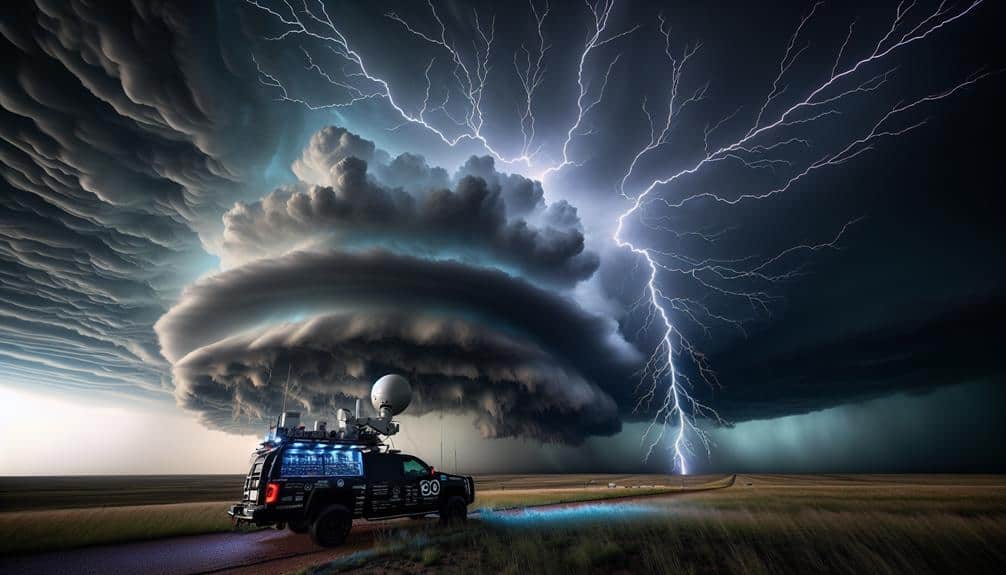Maintaining mental health is crucial for storm chasers due to the high-stress environments and traumatic events we frequently experience. By managing stress and anxiety through self-care, exercise, and mindfulness, we can remain operationally ready. Coping strategies and professional assistance promote resilience and emotional stability. Building a strong support network of peers, family, and professionals is essential for emotional well-being. Recognizing burnout early allows for timely intervention. Balancing risk and safety is improved through stress management and teamwork. Understanding these aspects helps us stay focused and effective in our pursuits. Explore further to uncover more crucial strategies.
Key Points
- Maintaining mental health ensures storm chasers remain calm and focused during high-pressure situations.
- Good mental health helps manage stress, enhancing performance and safety during storm chasing.
- Emotional resilience allows storm chasers to quickly recover from traumatic experiences encountered in the field.
- A strong support network, including mental health services, provides essential emotional backing and coping strategies.
Managing Stress and Anxiety
Effectively managing stress and anxiety is necessary for storm chasers to maintain their mental health and performance in high-pressure situations. We can achieve this through various self-care techniques and mindfulness practices. By prioritizing these methods, we enhance our ability to remain calm and focused during intense storm-chasing activities.
Self-care techniques are a cornerstone of effective stress management strategies. Regular physical exercise helps reduce anxiety levels and improve overall mood. Additionally, maintaining a balanced diet and getting adequate sleep can greatly impact our stress resilience.
Mindfulness practices, such as deep breathing and meditation, enable us to stay grounded. These techniques help us cultivate present-moment awareness, which is pivotal when navigating unpredictable environments. Simple mindfulness exercises, like paying attention to our breath or engaging in a brief body scan, can quickly alleviate stress.
Relaxation exercises also play a crucial role in managing anxiety. Progressive muscle relaxation and guided imagery are particularly effective. These exercises promote physical relaxation and mental clarity, allowing us to decompress after high-stress situations.
Coping With Traumatic Events
When facing traumatic events, it's necessary for storm chasers to employ evidence-based coping strategies to mitigate psychological impact. Implementing self-care practices is essential for our emotional well-being. Activities such as regular physical exercise, mindful meditation, and adequate sleep are foundational in maintaining mental health. Engaging in hobbies or creative outlets can also serve as effective stress relievers.
In addition to self-care, accessing mental health resources is crucial for trauma recovery. Professional counseling or therapy provides a structured environment to process traumatic experiences. Cognitive-behavioral therapy (CBT), for example, has been shown to be effective in treating trauma-related symptoms. Peer support groups offer a communal space where we can share our experiences and receive mutual support, fostering a sense of camaraderie and understanding.
Furthermore, maintaining a strong support network is essential. Friends, family, and colleagues can provide emotional support, practical help, and reassurance during challenging times. These connections anchor us, making it easier to navigate the aftermath of traumatic events. By integrating these strategies, we can enhance our resilience and continue our critical work with a fortified mental state.
Importance of Emotional Resilience
As storm chasers, we frequently confront high-stress situations that require us to stay composed and effective. Emotional resilience enables us to manage these intense circumstances and cope with the trauma that may follow.
Managing High-Stress Situations
Emotional resilience is necessary for storm chasers to effectively navigate the high-stress situations they frequently encounter. When we're out in the field, our ability to manage stress directly impacts our performance and safety. High-stress environments demand rapid decision-making, and stress management skills are vital to maintaining mental wellness. By staying calm under pressure, we can make clear, rational decisions that could potentially save lives.
Moreover, emotional resilience helps us bounce back from difficult experiences quickly. The unpredictability of storms and the constant threat they pose require us to have a robust mental framework. Maintaining this framework involves regular mental wellness practices, such as mindfulness and self-reflection, which can strengthen our emotional resilience. A strong mental state enables us to stay focused on our missions, guaranteeing that we don't make errors due to emotional fatigue.
In our profession, the stakes are high, and the margin for error is narrow. By prioritizing stress management and mental wellness, we equip ourselves to handle the intense situations we face. This not only enhances our effectiveness but also secures that we can continue to chase storms safely and sustainably over the long term.
Coping With Trauma
Facing the aftermath of traumatic experiences requires us to cultivate a high level of emotional strength. As storm chasers, we're often exposed to intense and distressing situations that can leave lasting psychological impacts. To mitigate these effects, engaging in effective self-care practices is necessary. Prioritizing activities that promote relaxation and mental well-being can greatly aid in our recovery process.
Therapy options, such as cognitive-behavioral therapy (CBT) and eye movement desensitization and reprocessing (EMDR), provide structured ways to process traumatic events. These methods, supported by empirical evidence, help us reframe and manage our traumatic memories.
Access to mental health resources is vital. Utilizing support groups, helplines, and online forums can offer additional layers of support. Implementing coping strategies, like mindfulness meditation, journaling, and physical exercise, can also play a significant role in maintaining our emotional stability.
Acknowledging the importance of these practices and resources empowers us to navigate the challenges inherent in storm chasing. By proactively addressing our mental health, we can enhance our resilience, ensuring we remain capable and focused in the face of adversity.
Let's prioritize emotional strength to continue our pursuits safely and sustainably.
Building a Support Network
Establishing a reliable support network is vital for storm chasers to maintain their mental health and guarantee operational effectiveness. We rely on peer support to share experiences, offer advice, and provide emotional backing during challenging times.
Peer support groups, composed of fellow storm chasers, can greatly enhance our mental wellness by fostering a sense of community and understanding. These groups allow us to discuss our unique stressors and develop coping strategies that are tailored to our high-risk profession.
Professional mental health services should also be integrated into our support network. Regular consultations with psychologists or counselors can offer valuable insights into managing stress, trauma, and other mental health challenges.
Additionally, maintaining open lines of communication with family and close friends is important. They can offer emotional support and a sense of normalcy, helping us stay grounded during and after intense storm-chasing activities.
We must prioritize building a support network that includes both peer support and professional resources. This holistic approach ensures that we aren't only prepared for the physical demands of storm chasing but also equipped to handle the psychological impacts, ultimately promoting sustained mental wellness and operational success.
Recognizing Burnout Symptoms

Identifying burnout symptoms early is significant for storm chasers to uphold their mental health and operational readiness. We need to stay vigilant in recognizing triggers such as chronic fatigue, irritability, and a lack of motivation. These symptoms can hinder our ability to make quick, rational decisions, which are crucial when tracking severe weather.
Regular mental health check-ins with ourselves and our teams can help us catch these signs before they escalate. It's crucial to ask ourselves and each other honest questions about our mental state and stress levels.
When we notice signs of burnout, it's vital to take immediate action through self-care techniques like scheduled breaks, mindfulness practices, and adequate sleep.
Seeking help from mental health professionals shouldn't be seen as a weakness but as a proactive measure to maintain our well-being. They can offer strategies tailored to our unique challenges in storm chasing.
Balancing Risk and Safety
As storm chasers, we must balance the excitement of the chase with the essential focus on safety. Evaluating weather conditions accurately helps us make informed decisions, while managing stress levels guarantees we maintain clarity and focus.
Assessing Weather Conditions
Balancing risk and safety requires storm chasers to carefully assess weather conditions using real-time data and forecasting models. By employing advanced weather analysis, we can better understand storm patterns, trajectories, and potential hazards. This level of precision is essential not only for capturing valuable meteorological data but also for securing our safety in the field. Utilizing tools like Doppler radar, satellite imagery, and computer simulations allows us to make informed decisions that reduce danger.
Our mental well being hinges on this thorough approach. When we've confidence in our data and analyses, we can navigate high-stress situations more effectively. The knowledge that we've conducted detailed weather analysis provides a foundation for sound decision-making, which, in turn, reduces anxiety and enhances our overall mental resilience.
Additionally, teamwork and communication are important. Sharing real-time updates and collaboratively interpreting data ensures that everyone on the team is aware of the latest developments. This collective vigilance not only optimizes our operational efficiency but also promotes a culture of mutual support, further strengthening our mental well being.
Managing Stress Levels
Managing stress levels is essential for storm chasers, requiring a proactive approach to balancing risk and safety in high-pressure environments. We must employ effective stress management techniques to navigate the inherent dangers of our work. The unpredictable nature of severe weather demands that we remain composed and focused. Stress, if unmanaged, can impair our decision-making abilities, which could lead to dangerous outcomes.
Effective self care is important for maintaining mental resilience. Regular breaks, proper nutrition, and adequate sleep are foundational elements of self-care that we shouldn't overlook. Mindfulness practices, such as deep-breathing exercises and meditation, can help us stay grounded during intense moments. By prioritizing these activities, we're better equipped to handle the physical and emotional demands of storm chasing.
Balancing risk and safety involves continuous assessment and adaptation. We need to set clear boundaries and know when to disengage from a situation that poses excessive risk. Utilizing advanced forecasting tools and maintaining open communication with team members fosters a collaborative environment where stress is more manageable. By integrating these strategies into our routine, we can enhance our performance and secure our well-being remains intact amidst the chaos.
Seeking Professional Help

Why should storm chasers consider seeking professional assistance for their mental health?
The intense and unpredictable nature of storm chasing can greatly impact our mental well-being. Therapy options, such as cognitive-behavioral therapy (CBT) and mindfulness-based stress reduction (MBSR), offer structured frameworks to manage anxiety and trauma. These therapy choices empower us to develop healthier coping mechanisms and enhance our resilience in high-stress environments.
Support groups specifically tailored for storm chasers can provide a sense of camaraderie and understanding. Sharing experiences with others who face similar challenges can be incredibly affirming and therapeutic. This communal approach fosters mental health awareness, encouraging us to recognize and address our psychological needs proactively.
In addition to professional interventions, integrating self-care strategies into our routine is essential. Techniques such as regular exercise, sufficient sleep, and mindfulness practices can help mitigate the negative effects of chronic stress. By prioritizing self-care, we can maintain a balanced mental state that allows us to perform at our best in the field.
Ultimately, seeking professional assistance doesn't limit our freedom; rather, it equips us with the tools to navigate our demanding profession more effectively. By acknowledging and addressing our mental health needs, we can guarantee our longevity and success as storm chasers.
Frequently Asked Questions
How Can Physical Fitness Impact a Storm Chaser's Mental Health?
Physical activity can greatly impact our mental health by promoting stress relief. Regular exercise helps us manage anxiety, enhances mood stability, and improves overall cognitive function. These benefits are essential for maintaining peak performance under pressure.
What Role Does Diet Play in Maintaining Mental Health for Storm Chasers?
We are aware a well-maintained diet guarantees nutritional balance, which directly supports our emotional stability. By consuming balanced meals, we equip ourselves with the necessary nutrients to handle stress better, enhancing our overall mental well-being.
How Do Storm Chasers Stay Motivated Despite Mental Health Challenges?
Facing mental health challenges head-on, we employ coping strategies and robust support systems. Our motivation techniques are nothing short of legendary, fostering mental resilience. Together, we conquer obstacles, ensuring our commitment to storm chasing remains unwavering.
Are There Specific Training Programs for Storm Chaser Mental Wellness?
Yes, there are specific training programs for storm chaser mental wellness. These programs often include mindfulness exercises, support groups, stress management techniques, and coping strategies to help us navigate the psychological demands of our work.
How Do Storm Chasers Unwind and Relax After a Chase?
We often unwind after a chase by engaging in meditation practices to clear our minds and reduce stress. Additionally, we immerse ourselves in creative hobbies, allowing us to recharge and maintain our mental and emotional balance.


